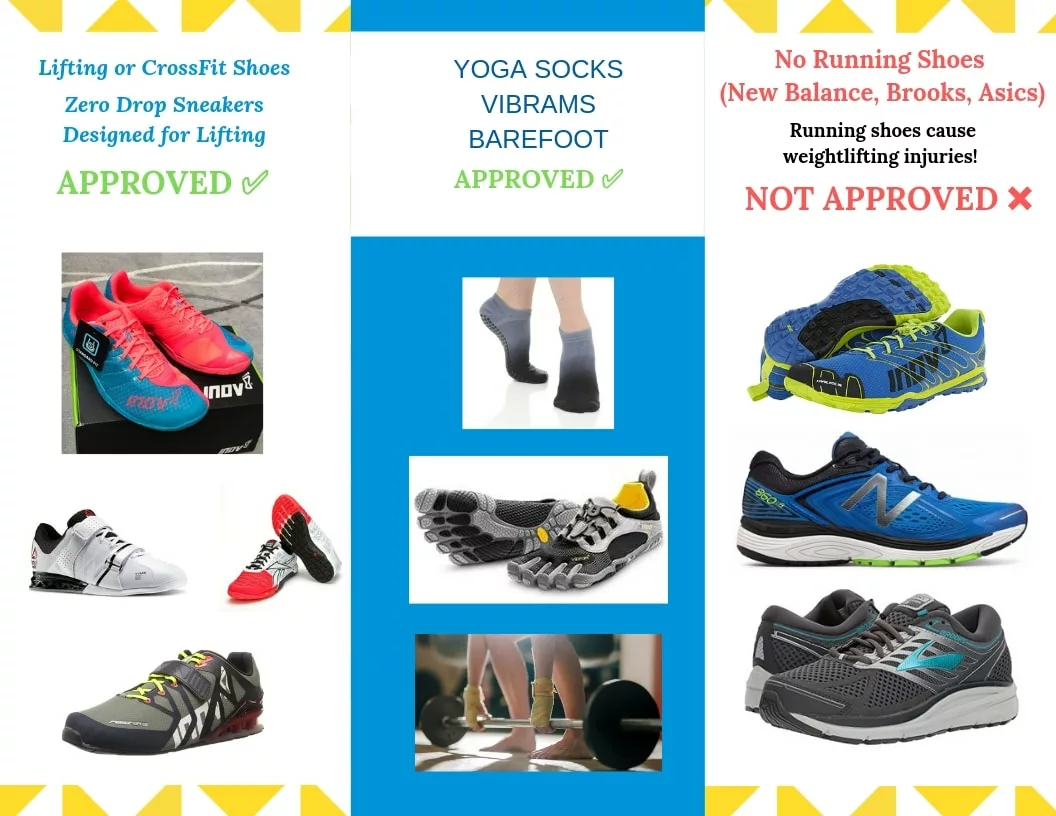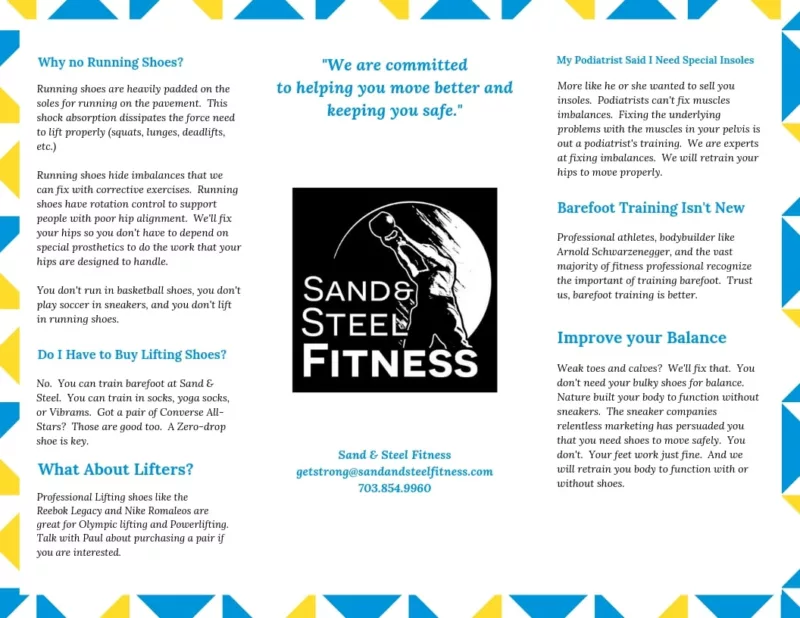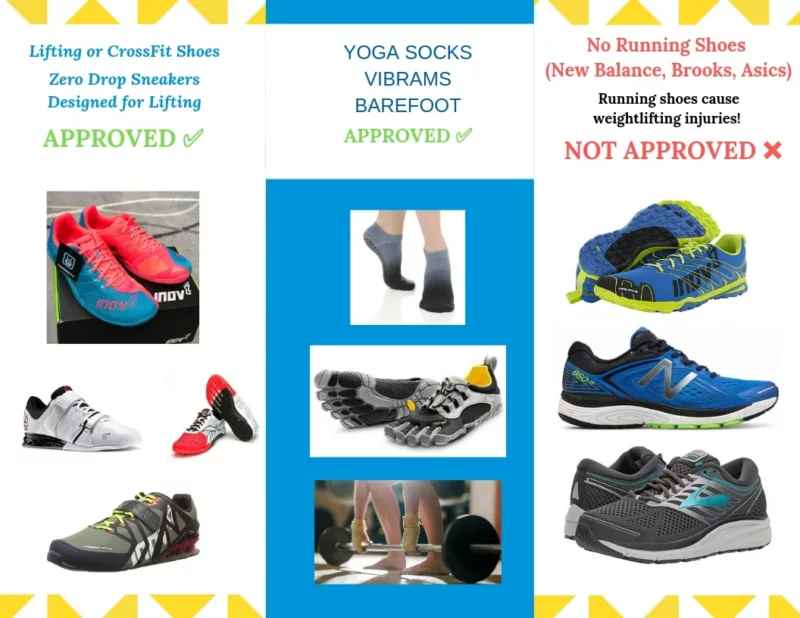Is Barefoot Training Healthy for your feet? What sneakers and shoes are best for weight lifting and functional training? Is it safe to wear running sneakers for lifting weights? Get the answers to these questions and more.
This article is out of date, please see our 2023 CrossFit Shoe Guide for the latest.
Barefoot Training vs Lifting in Running Sneakers
It’s time to make the switch. Nike, Asics, New Balance, and a host of other companies make fantastic running sneakers. But running sneakers are designed for running. Lifting shoes (sneakers) are designed for lifting. Your running sneakers aren’t designed for lifting. That’s why all these same companies make special shoes for lifting.
Sneaker Policies
Our sneaker policy is simple:
- No running shoes,
- No hiking shoes,
- No trail running shoes.
Policy Questions
- Why do you have this policy?
- If I can’t wear running shoes, what else can I wear?
- My Podiatrist said I need special shoes.
- What if I have a Foot Injury?
- Policy Exceptions
(1) Why No Running Shoes?
For one, they will be dirty since you run in them outside. This puts members who train barefoot at risk for bacterial infections. Two, the soft materials in the soles of running shoes will place shear forces on your knees and lead to injuries. Three, building up the intrinsic muscles in your feet is an essential part of balance. This can’t be done with running shoes. Four, Running shoes hide pronation and supination control problems … which cause hip issues like tight IT Band Syndrome. For more information on the benefits of training barefoot (and not using running sneakers for weight lifting), please see our article.
(1) How Bad Running Sneakers Are For Lifting:
- Would you run a half marathon in basketball sneakers?
- Would you try to play soccer or football with running sneakers?
- So why do you think weight lifting in running sneakers is a good idea? It’s not safe. There are places to save on fitness… the health of your feet, ankles, and knees is not it.
(2) Great Sneakers for Weight Lifting:
- Reebok: Nano and Legacy (Lifter)
- Nike: Metcon and Romaleos (Lifter)
- Innov8: BARE-XF 210 V2, F-Lite 235, F-Lite 290
- Nobull Trainers
(2) Great Alternative Footwear for Weight Lifting:
- Yoga Socks (available at Sand and Steel for $15)
- Barefoot
- Converse All-Star (Chucks)
- Vibrams
- Most zero-drop sneakers
(2) Bringing a Pair of Shoes:
Barefoot training is great for most kinds of fitness we do at Sand and Steel. It’s not good for cycling or rowing though. It can be challenging for some members for jump rope, treadmill, and TRX training.
(2) Investing in a Pair of Workout Sneakers:
Members should invest in a pair of workout shoes. Great sneakers can be purchased for as little as $50. Reebok runs frequent sales. 6PM is a discount website that sells Innov8. Zappos sells a wide range of weight lifting / crossfit shoes.
(2) Buying Lifters:
Lifters shoes like the Nike Romaleos 3 or the Adidas Powerlift 4 are considerably better than crossfit sneakers for barbell work such as squats, cleans, and snatches. If you plan to do a fair amount of barbell work in your program — lifters are a worthwhile investment. Especially, if you have limited ankle dorsi-flexion — it’s recommended you buy a pair powerlifting shoes.
(3) Your Podiatrist Said you Need Special Shoes / Soles:
He or she might right. You may have allowed your feet to become so weak, that the normally every function of walking around is too much strain on your knees, ankles, or plantars tendon. And so, wear those bulky shoes for the purpose or walking or standing. But don’t overstate your podiatrist’s recommendation for the purpose of hearing an answer you want.
Ask your podiatrist whether it’s safe to take off your special shoes or soles for the purpose of rehabilitative training. If your feet are so weak as to require special insoles or special shoes … that’s what we should fix first. If your podiatrist tells you that you have to wear these special shoes at all times…. you should probably see a physical therapist before starting with us.
(3) Your Podiatrist is Not in the Business of Fixing Weak Feet Muscles:
But we are. All professionals make recommendations based on what know how to do. We can fix weak feet — we do it all the time. Your podiatrist probably does surgery for a living. And he or she knows what happens if you ignore muscle weakness. So he or she sells you some shoes to prevent that. Wouldn’t it be better to strengthen your feet so you don’t have to wear special, expensive shoes?
(4) What if you Get a Foot Injury?
Definitely wear shoes if you need the support. But they still shouldn’t be running shoes.
(5) Policy Exceptions:
The purpose of our policy is benefit and protect your health. If you think need an exception to this policy for whatever reason, come talk to us. We don’t sell sneakers. The only reason we have this policy is so you get the maximum benefit of training at Sand and Steel. It would be easier if we just said screw it, let our members wear whatever shoes they want. It’s your body afterall. But at the end of the day, you are coming to us because you want our help and you want to learn to exercise safely. So take our advice, and buy some decent shoes for working out. Leave your Asics, Sauconys, and New Balance shoes to the purpose they are intended — running.



I love training barefoot – it seemed weird at first, but it helps the trainers keep me in proper form!